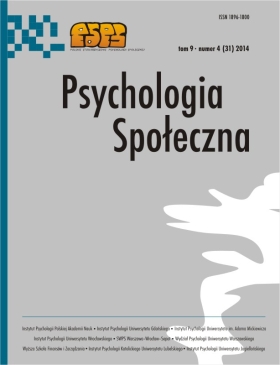Rola emocji (automatycznych vs. refl eksyjnych) w procesach intuicyjnych ocen społecznych
The role of automatic vs. reflective emotions in intuitive social judgments
Author(s): Kamil K. Imbir, Magdalena RutniewskaSubject(s): Psychology
Published by: Wydawnictwo Naukowe Scholar Sp. z o.o.
Keywords: positive-negative asymmetry; diffusive influence of emotions; intuitive social assessment; incidental affect
Summary/Abstract: The article focuses on the relationship between emotions and social judgments. Emotional processes have been divided according to their origin (Jarymowicz, 2009; Jarymowicz & Imbir, 2010) into automatic and reflective. We expected that automatic emotions will increase polarity of judgments while the reflective emotions will not influence the evaluations. The study involved 120 participants, high school students and students of various University of Warsaw departments. Emotions were primed by listening to recordings of sentences incorporating words denoting different emotional categories. After having listened to the sentences, the participants were asked to evaluate photographs of women and men on a number of positive and negative personality traits. They were instructed to follow their intuition and work quickly. The findings show that elicitation of automatic emotions increased the intensity of attributed negative traits and decreased the intensity of positive traits, that is replicated the classic effect of positive negate-asymmetry in person perception. In conditions of elicitation of reflective emotions the asymmetric effects were not observed. The emotion that affected the ratings the most, compared to the control conditions, were automatic negative emotions. The results confirm the hypothesis that the automatic emotions insert a more diffuse influence on cognitive processes than the reflective emotions (see: Imbir & Jarymowicz, 2013) as well as presence of the classic positive- negative asymmetry in social judgments (Czapiński & Peeters, 1990).
Journal: Psychologia Społeczna
- Issue Year: IX/2014
- Issue No: 31
- Page Range: 455-465
- Page Count: 11

